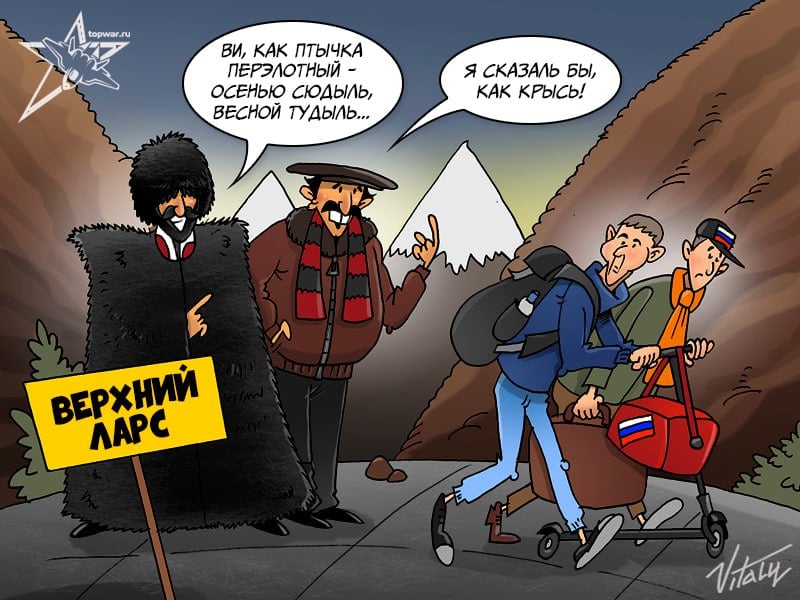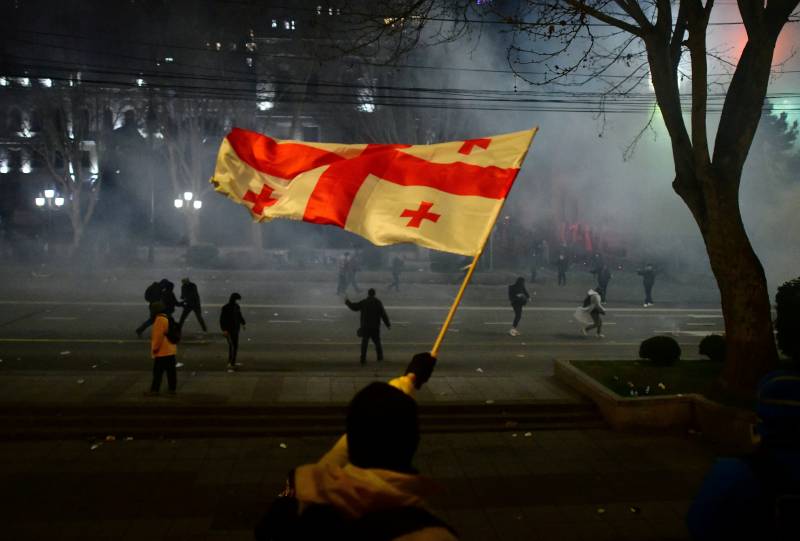Reverse thrust - Upper Lars is crowded again

Georgia lets go
Spring has come, and the problems of those who have left Russia have aggravated. The main hot spot at the beginning of March was the Russian-Georgian border, or rather, the Upper Lars border crossing.
It's all about the massive flow of Russian "tourists" who suddenly felt uncomfortable in sunny and hospitable Georgia. According to eyewitnesses, a multi-kilometer traffic jam formed on one of the sections of the Georgian Military Highway. They stood for 4-5 hours. Snowfall added a little entourage, which is why the road was blocked for three days.
But the main burden on Upper Lars was added by the citizens liable for military service who fled Russia in September. Moreover, the reason for the return is more than paradoxical. Russia did not issue an order to complete the mobilization and did not even announce a moral pardon for all those who fled. By the way, we have no other forms of retribution for cowards.
The reason for returning to the same “Mordor”, from which they left in a panic last autumn, was completely democratic processes in Georgia itself. The local parliament dared to pass the law on foreign agents in the first reading. The initiative belongs to the Power of the People movement and consists of two bills - On the Transparency of Foreign Influence and On the Registration of Foreign Agents. According to the first document, all offices that receive from abroad up to one-fifth of their annual income automatically become agents of foreign influence.
The parliamentarians liked the initiative, and on March 7 the bill was approved. There is nothing criminal in this - in the United States, since 1938, a similar law "On the registration of foreign agents" (FARA - Foreign Agents Registration Act) has been in force. The Americans adopted it in the wake of the fight against fascism, but the Third Reich collapsed long ago, and the law is still alive. Moreover, members of the Power of the People claim that they actually copied the essence of their initiative from American law.
The idea is simple - all organizations representing the interests of foreign states to one degree or another should publicly report on this. In the United States, this was explained by the desire to facilitate the assessment of events by ordinary citizens and those in power. In case of failure to comply with the requirements of the law, the unfortunate are threatened with imprisonment.
Indeed, a good idea, although a little draconian. Only now a similar Russian law in America causes a real allergy. For example, Australians can - in 2018 they passed the Foreign Influence Transparency Program Act. In Hungary and Israel, similar “foreign agency” restrictions have been in place for six to seven years.

Source: reuters.com
Georgian parliamentarians also wished to join the elite club of fighters with foreign influence. But it didn't work. Or rather, they weren't allowed. US Ambassador to Georgia Kelly Degnan:
State Department spokesman Ned Price said the United States has the ability to punish anyone who infringes on human rights. In any country in the world. Actually, after that in Tbilisi it started.
Home, Relocants!
Punctuation and syntax preserved:
Or this:
These panicked exclamations from the public who left for Georgia. The March holidays did not work out for those who escaped, frankly.
At first glance, a completely democratic protest caused centrifugal sentiments among Russians. But after all, the Georgian popular performances were supported by the Americans themselves, and the Europeans in their news ribbons diligently dispersed the Georgian Maidan. Look at these fresh faces of young Tbilisi revolutionaries wrapped in national flags and not afraid of police water cannons. Heroes in general.
Just do not see the Russian lovers of democratic values in the crowds of protesters. They are all on Upper Lars. And after all, it cannot be said that among the autumn defectors there is one exceptional office plankton, which is shameful to blame for cowardice. As Andrei Medvedev so aptly puts it, let's call these "liberal soybean snowflakes."
Among those who escaped from mobilization there are also former military men who are in the reserve, probably many with combat experience. The most needed caste of people in revolutionary Georgia today. After all, they love democracy, but under tyrants they are stuffy?
The local Maidan did not need “good Russians”. Moreover, it has become dangerous for relocants to be in a country where the voice of the people is about to be heard. By the way, they heard him, or rather, the voice of the State Department, and they no longer talk about the foreign agency riffraff.
The bill was withdrawn, the president promised to veto, although it does not really solve anything. If Parliament had wanted to adopt a law on foreign influence, the President's word would have been easily passed by a majority vote. And the true face of the Georgian protest is very well characterized by Ukrainian and American flags in the crowd, anti-Russian slogans, and later cries of “Sukhumi! Sukhumi! Then everything follows the “color revolution” scheme run in Ukraine - young people glue hearts on police shields and give flowers.
A characteristic detail is that as soon as the government made concessions, the street protest put forward new conditions. Now on the agenda is the abolition of compulsory conscription into the army, and from some sources there are calls for the resignation of the Georgian government.
But let's leave the topic of Georgian protest - after all, this is an internal affair of a sovereign state. Let it carry a brightly anti-Russian context. Now it is important to understand what to do with prodigal sons and daughters who suddenly remembered Russian citizenship. To understand and to forgive?
It looks like that will happen. And this is a precedent with far-reaching consequences.
Firstly, there are still a lot of undecided “waiters” in the country who can be inspired by the example of a happy return from Georgia. They will dig up some money and wrap it up in the near abroad. Because of the fear of the next wave of mobilization and what is even stronger. There is nothing to fear now. You can return at any time, and nothing will happen to you.
The assumption that all potential traitors left Russia last year is very naive. The triumphant flight of brothers from Georgia will add to such confidence in the correctness of the chosen path.
Secondly, the silence, albeit contemptuous, in relation to the relocators is a spit in the direction of the rest of the Russians. Those who did not run away from mobilization, shed blood on the Western fronts and help in this situation in whatever way they can. Formally, for the state, they are the same citizens as the runaway cowards. On the same level, so to speak.
No, there is no call here to organize concentration camps for the re-education of returnees. But at the state level, certain conclusions should be drawn about the freedoms and civil rights of such personalities-foreign agents. Otherwise, these conclusions will be drawn by those who have returned from the fields of a special military operation.
And in the end, let's return to the eternal topic of a restless foreign agent.
The Canadian authorities initiated consultations on the creation of a register of foreign agents. On March 10, Canada's Minister of Public Safety, Marco Mendicino, made a statement. The State Department is expectedly silent.
Are we waiting for a wave of return migration already from Canada?
Information